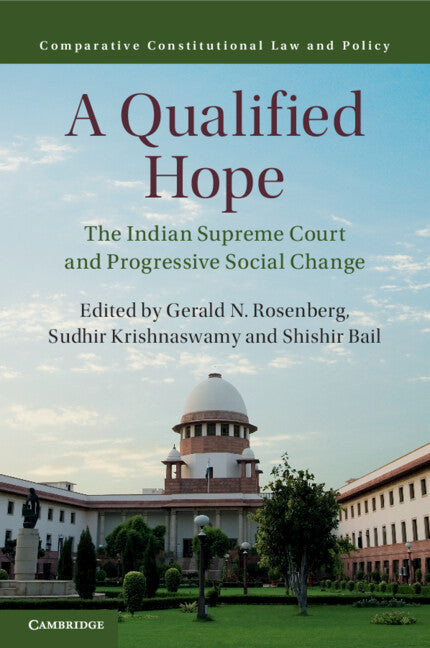Freshly Printed - allow 8 days lead
Couldn't load pickup availability
A Qualified Hope
The Indian Supreme Court and Progressive Social Change
Examines whether the Indian Supreme Court can produce progressive social change and improve the lives of the relatively disadvantaged.
Gerald N. Rosenberg (Edited by), Sudhir Krishnaswamy (Edited by), Shishir Bail (Edited by)
9781108464802, Cambridge University Press
Paperback / softback, published 23 June 2022
375 pages, 8 b/w illus.
22.9 x 15 x 2 cm, 0.55 kg
The Indian Supreme Court is widely seen as a vanguard of progressive social change. Yet there are no systematic studies of whether its progressive decisions actually improve the lives of the relatively disadvantaged. This book presents the first collection of original empirical studies on the impact of the Indian Supreme Court's most progressive decisions. Combining original datasets with in-depth qualitative research, the chapters provide a rigorous examination of the conditions under which judicial decisions can make a difference to those in need. These studies reveal that the Indian Supreme Court, like its US counterpart, is largely constrained in its efforts. Yet, through the broad sweep of constitutional rights in the Indian Constitution, the Court's procedural innovations, and its institutional independence, the Indian Supreme Court can sometimes make a difference - in the lives of those most in need.
Introduction
The Indian Supreme Court and progressive social change Gerald N. Rosenberg, Sudhir Krishnaswamy and Shishir Bail
Part I. The Supreme Court of India – An Institutional Overview: 1. The structure and functioning of the Supreme Court of India Nick Robinson
2. The Supreme Court of India: an empirical overview of the institution Aparna Chandra, William H. J. Hubbard and Sital Kalantry
3. The recent evolution of public interest litigation in the Indian Supreme Court Poorvi Chitalkar and Varun Gauri
4. Suo Motu intervention and the Indian judiciary Marc Galanter and Vasujith Ram
5. Public trust in the Indian judiciary: the power to transform Sudhir Krishnaswamy and Siddharth Swaminathan
Part II. The Supreme Court of India, Social and Political Mobilization: 6. The art of buying time: street vendor politics and legal mobilization in metropolitan India Karthik Rao-Cavale
7. Court as a symbolic resource: the Indra Sawhney case and the Dalit Muslim mobilization Mohsin Alam-Bhat
8. PUCL v. Union of India: political mobilization and the right to food Alyssa Brierley
Part III. Welfare Rights and the Environment: 9. A case for qualified hope? The Supreme Court of India and the Midday Meal Decision Rosalind Dixon and Rishad Chowdhury
10. Implementation in the Delhi pollution case: lessons for the future Robert Moog
Part IV. Discrimination: 11. The polarizing face of law: religious conversion judgments and political discourse in India Shylashri Shankar
12. Evaluating the impact of the Indian Supreme Court judgment on sex-selective abortion Sital Kalantry and Arindam Nandi
Conclusion. Neither a silver bullet nor a hollow hope: the Indian Supreme Court and progressive social change Gerald N. Rosenberg, Shishir Bail and Sudhir Krishnaswamy.
Subject Areas: Constitutional & administrative law [LND], Comparative law [LAM], Law [L]


